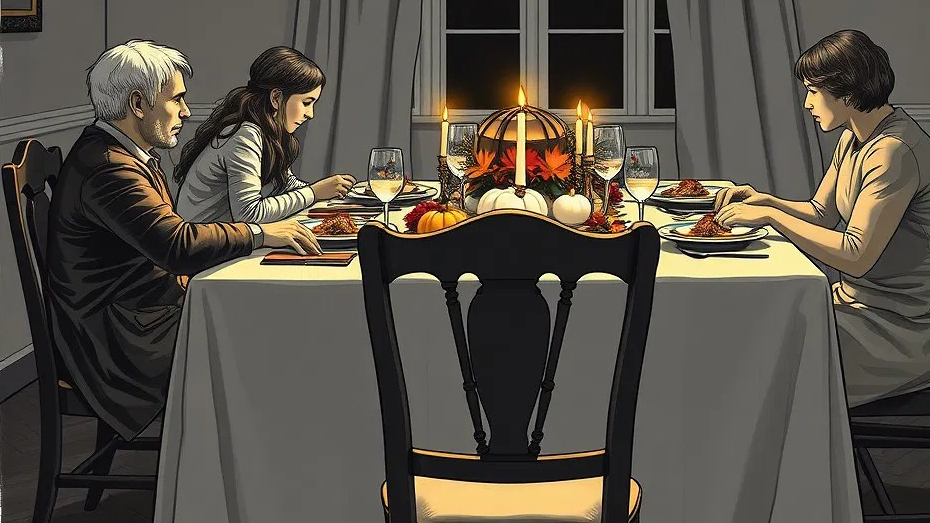
Share This Article
Thanksgiving hits differently when someone you love is gone. Let grief wash over you—the pain and memories are part of the love still present in their absence.
Let’s face it—grief doesn’t take a break for the holidays. In fact, it can feel even heavier during Thanksgiving. If you’ve lost someone you love, the holiday season has a way of shining a harsh light on that empty chair, that silent voice, that missing piece of your world. Everything—the laughter, the smell of pumpkin pie, the clinking glasses—can hit differently, reminding you of what’s gone. And you know what? It’s okay to feel that way. It’s okay if joy feels out of reach right now.
Grief is complex. It doesn’t follow a straight line or a timeline, and during Thanksgiving, it can feel especially messy. You might catch yourself smiling at a memory one moment and sobbing the next. That’s normal. The most important thing is this: acknowledge your emotions. Don’t bottle them up or pretend everything is fine. If the tears come, let them. If you feel angry, or numb, or just plain tired, let those feelings breathe. You’re human, and it’s okay to show it.
Thanksgiving has a way of stirring up memories—good ones, painful ones, everything in between. The truth is, the absence of a loved one often feels loudest when we’re surrounded by the things that used to bring us together. So how do you get through a holiday that feels both too much and not enough? Let’s talk about some ways to cope while honoring the love that remains.
Coping Strategies for Thanksgiving
Grieving during Thanksgiving is hard—there’s no sugarcoating it. But there are ways to make it a little more manageable, amidst the lingering pain. Here are a few things you can try:
Talk About Them
Don’t be afraid to say their name, share a story, or bring them into the conversation. It might feel raw or scary at first but sharing memories of your loved one can also be comforting. Maybe it’s the time they burned the turkey, or the way they always made everyone laugh at the dinner table. When you speak their name, you’re keeping their presence alive, even in their absence. And who knows? Others might open up and share their own stories too, turning pain into connection.
Write It All Out
Sometimes, the words are too hard to say out loud. That’s where a journal comes in. Write down your thoughts, your feelings, or even a letter to your loved one. Tell them what you miss, what’s on your mind, or what you’re struggling with. And, don’t bother with the sentences or grammar. The goal is to give your grief somewhere to land. Writing can be a safe, private way to unload what’s in your heart.
Look Through Photos Together
Pull out those photo albums or scroll through old pictures on your phone. Yes, it might hurt, but it can also be a way to celebrate the love you shared. Let the memories wash over you—both the bittersweet and the beautiful. If it feels right, invite others to look through them with you. Those shared moments of reminiscing can spark joy and remind you that their impact is still alive in the people who loved them.
Continuing and Creating Traditions
Thanksgiving traditions don’t have to disappear after loss—they can evolve in ways that feel right for you.
Maintain Existing Family Traditions
If there’s a tradition that feels sacred, like making your loved one’s signature dish or gathering around the table to share what you’re thankful for, hold onto it. However, allow yourself the grace to modify traditions if they feel too overwhelming. You can honor the past while also making space for where you are now.
Create New Rituals to Honor Your Loved One
Starting a new tradition can help fill the emotional void with meaningful connection. Light a candle in their memory. Set a place for them at the table. Dedicate a part of the meal to them or share stories about their life. These small acts of remembrance can keep their presence alive while also allowing you to engage with Thanksgiving in a new way.
Listen to Yourself—It’s Okay to Step Away
You don’t have to do everything this Thanksgiving. If certain activities feel too hard or traditions feel heavy, give yourself permission to skip them. If you need a break during the day to step outside or sit quietly, take it. Grief doesn’t come with rules, so trust yourself to do what feels right for your heart.
How to Find Support While Grieving
Grief can feel isolating, especially during the holidays, but you don’t have to go through it alone.
Lean on Support Groups
Consider joining a grief support group, either in person or online. When you hear from others who have experienced loss, it can provide comfort and remind you that you’re not alone. Sharing your story can also lighten the emotional load.
Talk to a Professional
If you’re struggling to manage your emotions, it's advisable to seek professional support that can be life-changing. Grief counselors and therapists are better placed to provide tools to get through the holidays and help you process your feelings in a healthy way.
Final Thoughts
Grieving during Thanksgiving is a deeply personal journey, and there’s no single way to approach it. Each year might feel different, and that’s okay. What matters most is that you honor your feelings and allow yourself to experience the holiday in a way that feels right for you. It can be through sharing stories, continuing or creating traditions, or simply sitting with your grief.
You might also consider professional support, in which case, Keys2Eternity is here for you. Our grief counselors specialize in helping individuals cope with the challenges of loss after bereavement. Feel free to browse our directory to find a counselor or support group that resonates with you.
Finally, grief and gratitude can coexist. And even in the heaviness of loss, there’s space for healing, reflection, and love. Take it one step at a time. You’re not alone, and you’re doing enough. ❤️
FAQs
How can I cope with grief during Thanksgiving?
Coping strategies include sharing memories of your loved one, writing in a journal, and engaging in meaningful rituals that honor their life.
What should I avoid during Thanksgiving while grieving?
Avoid forcing yourself into activities or traditions that feel too overwhelming. Give yourself permission to step back and focus on what feels manageable.
What self-care tips can help during the holiday?
Prioritize self-care by taking breaks, spending quiet moments reflecting, or seeking comfort from friends, family, or a trusted professional.
How can I honor my loved one during Thanksgiving?
You can honor them by lighting a candle, sharing stories, setting a place for them at the table.
Related Articles
Related Articles






